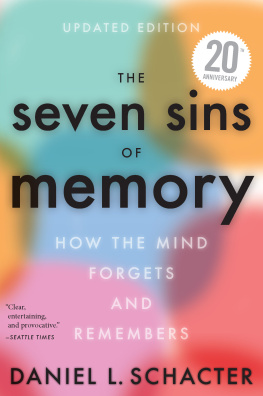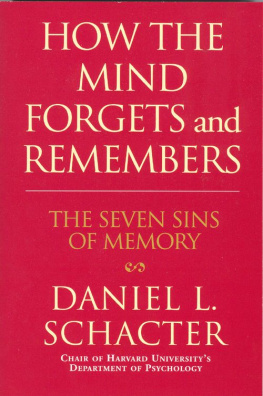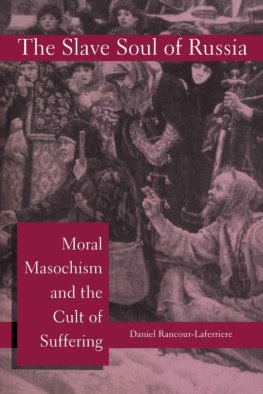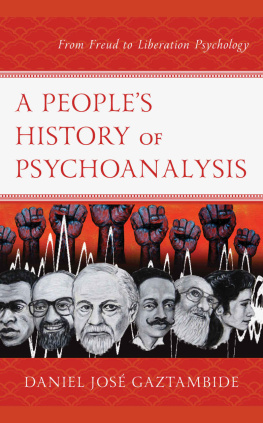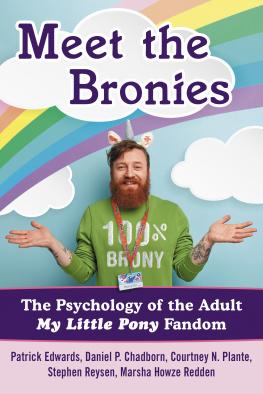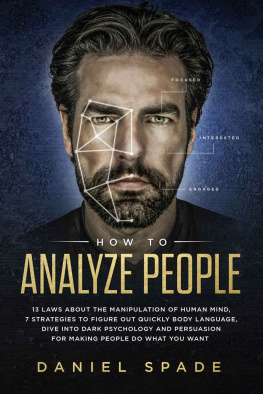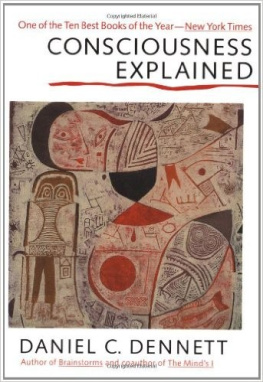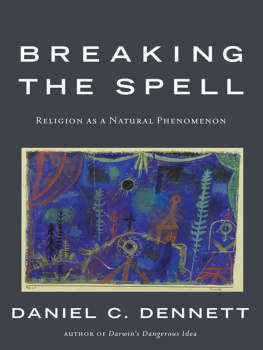Daniel L. Schacter - Psychology
Here you can read online Daniel L. Schacter - Psychology full text of the book (entire story) in english for free. Download pdf and epub, get meaning, cover and reviews about this ebook. year: 2017, publisher: Macmillan Learning, genre: Romance novel. Description of the work, (preface) as well as reviews are available. Best literature library LitArk.com created for fans of good reading and offers a wide selection of genres:
Romance novel
Science fiction
Adventure
Detective
Science
History
Home and family
Prose
Art
Politics
Computer
Non-fiction
Religion
Business
Children
Humor
Choose a favorite category and find really read worthwhile books. Enjoy immersion in the world of imagination, feel the emotions of the characters or learn something new for yourself, make an fascinating discovery.

- Book:Psychology
- Author:
- Publisher:Macmillan Learning
- Genre:
- Year:2017
- Rating:5 / 5
- Favourites:Add to favourites
- Your mark:
- 100
- 1
- 2
- 3
- 4
- 5
Psychology: summary, description and annotation
We offer to read an annotation, description, summary or preface (depends on what the author of the book "Psychology" wrote himself). If you haven't found the necessary information about the book — write in the comments, we will try to find it.
Psychology — read online for free the complete book (whole text) full work
Below is the text of the book, divided by pages. System saving the place of the last page read, allows you to conveniently read the book "Psychology" online for free, without having to search again every time where you left off. Put a bookmark, and you can go to the page where you finished reading at any time.
Font size:
Interval:
Bookmark:
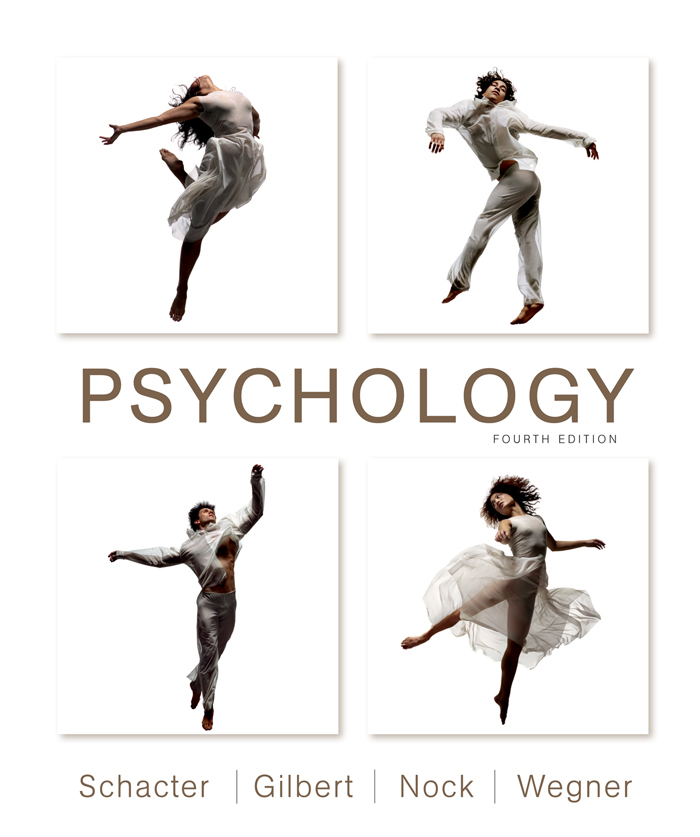
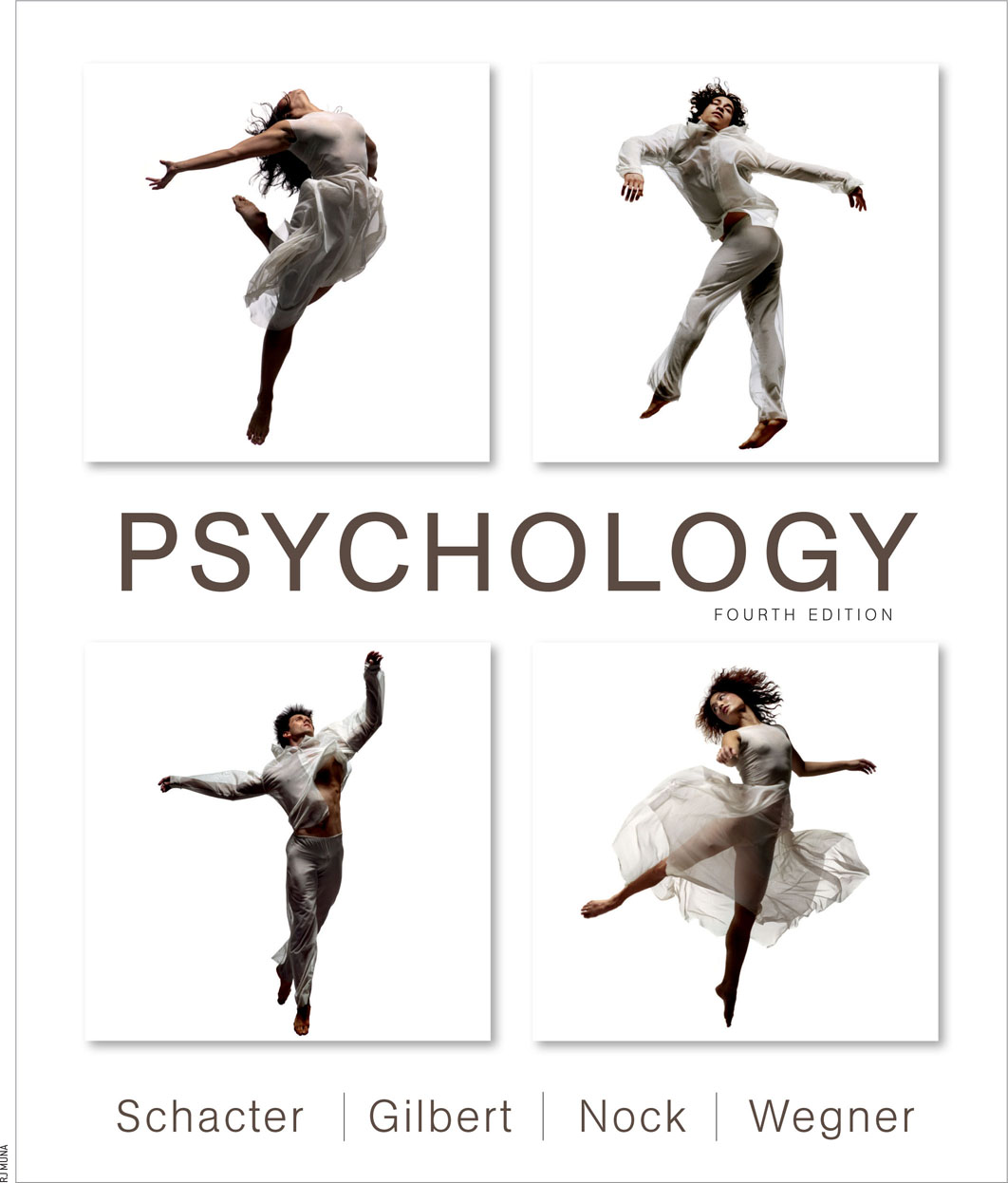
When we view the striking poses adopted by each of these dancers, its hard to resist wondering: What thoughts and feelings are they trying to express through their actions? What came before each pose and what comes next? What stories are they trying to tell?
Psychological scientists grapple with such questions when they attempt to unravel the complexities of human thought, emotion, and behavior. These photos by RJ Muna grabbed us because they invite precisely the kinds of questions that we find endlessly fascinating in our own work and that of our colleagues in the field. They also hint at the beauty and complexity of human behavior, which drew us to the field in the first place.

Vice President, Social Sciences and High School : Charles Linsmeier
Senior Acquisitions Editor: Daniel DeBonis
Senior Development Editor: Valerie Raymond
Assistant Editor: Kimberly Morgan Smith
Senior Marketing Manager: Lindsay Johnson
Marketing Assistant: Morgan Ratner
Executive Media Editor: Noel Hohnstine
Media Editor: Stefani Wallace
Media Producer: Joseph Tomasso
Director, Content Management Enhancement: Tracey Kuehn
Managing Editor, Sciences and Social Sciences: Lisa Kinne
Senior Project Editor: Jane ONeill
Senior Production Supervisor: Sarah Segal
Director of Design, Content Management: Diana Blume
Senior Design Manager and Cover Designer: Vicki Tomaselli
Interior Designer: Marsha Cohen, Parallelogram Graphics
Senior Photo Editor: Cecilia Varas
Photo Researcher: Elyse Rieder
Art Manager: Matt McAdams
Illustrations: Eli Ensor, Mapping Specialists, Evelyn Pence, Jackie Heda, Matthew McAdams, Matt Holt, Christy Krames, Don Stewart, and Todd Buck
Composition: MPS Ltd.
Printing and Binding: LSC Communications
Cover Photographs: RJ Muna
Library of Congress Control Number: 2016958177
ISBN-13: 978-1-4641-5665-6
2017, 2014, 2011, 2009 by Worth Publishers
All rights reserved
Printed in the United States of America
First printing
Worth Publishers
One New York Plaza
Suite 4500
New York, NY 10004-1562
www.macmillanlearning.com
We dedicate this edition to the memory of
Dan Wegner
our co-author, colleague, and deeply missed friend.
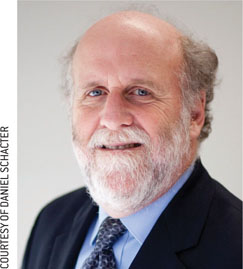
Daniel Schacter is William R. Kenan, Jr. Professor of Psychology at Harvard University. Dan received his BA degree from the University of North Carolina at Chapel Hill. He subsequently developed a keen interest in amnesic disorders associated with various kinds of brain damage. He continued his research and education at the University of Toronto, where he received his PhD in 1981. He taught on the faculty at Toronto for the next six years before joining the psychology department at the University of Arizona in 1987. In 1991, he joined the faculty at Harvard University. His research explores the relationship between conscious and unconscious forms of memory, the nature of distortions and errors in remembering, and the ways in which we use memory to imagine future events. Many of his studies are summarized in his 1996 book, Searching for Memory: The Brain, the Mind, and the Past, and his 2001 book, The Seven Sins of Memory: How the Mind Forgets and Remembers, both winners of the American Psychological Associations William James Book Award. He has also received a number of awards for teaching and research, including the Harvard-Radcliffe Phi Beta Kappa Teaching Prize, the Award for Distinguished Scientific Contributions from the American Psychological Association, and the William James Fellow Award from the Association for Psychological Science. In 2013, he was elected to the National Academy of Sciences.
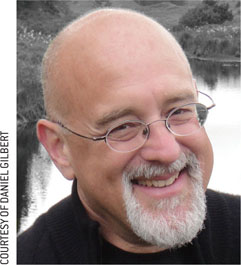
Daniel Gilbert is the Edgar Pierce Professor of Psychology at Harvard University. Dan received his BA from the University of Colorado at Denver and his PhD from Princeton University. From 1985 to 1996 he taught at the University of Texas at Austin, and in 1996 he joined the faculty of Harvard University. He has received the American Psychological Associations Distinguished Scientific Award for an Early Career Contribution to Psychology and the Diener Award for Outstanding Contributions to Social Psychology, and has won teaching awards that include the Phi Beta Kappa Teaching Prize and the Harvard College Professorship. His research focuses on how and how well people think about their emotional reactions to future events. He is the author of the international best seller Stumbling on Happiness, which won the Royal Societys General Prize for best popular science book of the year, he is the co-writer and host of the PBS television series This Emotional Life, and yes, hes that guy in the Prudential commercials.
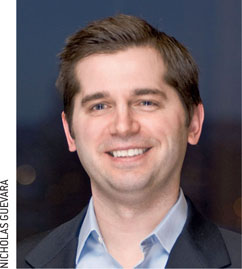
Matthew Nock is a Professor of Psychology at Harvard University. Matt received his BA from Boston University (1995) and his PhD from Yale University (2003), and he completed his clinical internship at Bellevue Hospital and the New York University Child Study Center (2003). He joined the faculty of Harvard University in 2003 and has been there ever since. While an undergraduate, he became very interested in the question of why people do things to intentionally harm themselves, and he has been conducting research aimed at answering this question since that time. His research is multidisciplinary in nature and involves a range of methodological approaches (e.g., epidemiologic surveys, laboratory-based experiments, and clinic-based studies) to understand better how these behaviors develop, how to predict them, and how to prevent their occurrence. He has received multiple teaching awards at Harvard and four early career awards recognizing his research, and in 2011 was named a MacArthur Fellow.
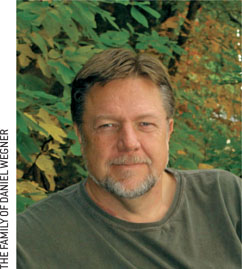
Daniel Wegner was the John Lindsley Professor of Psychology in Memory of William James at Harvard University. He received his BS in 1970 and his PhD in 1974, both from Michigan State University. He began his teaching career at Trinity University in San Antonio, Texas, before receiving his appointments at the University of Virginia in 1990 and then at Harvard University in 2000. He was a Fellow of the American Academy of Arts and Sciences and also the recipient of the William James Award from the Association for Psychological Science, the Award for Distinguished Scientific Contributions from the American Psychological Association, and the Distinguished Scientist Award from the Society of Experimental Social Psychology. His research focused on thought suppression and mental control, transactive memory in relationships and groups, and the experience of conscious will. His work on thought suppression and consciousness served as the basis of two popular books,
Font size:
Interval:
Bookmark:
Similar books «Psychology»
Look at similar books to Psychology. We have selected literature similar in name and meaning in the hope of providing readers with more options to find new, interesting, not yet read works.
Discussion, reviews of the book Psychology and just readers' own opinions. Leave your comments, write what you think about the work, its meaning or the main characters. Specify what exactly you liked and what you didn't like, and why you think so.

